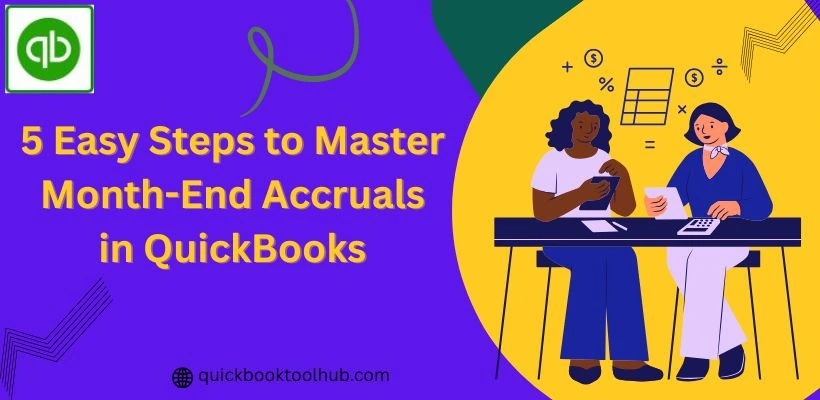
In accounting language, Month-End Accruals in QuickBooks refer to the process of recording expenses or revenues during the period they are earned but not yet received or paid at the end of the accounting period.
In simple words, we can say that any expenses or revenues are incurred in the current month but not paid or received during the month.
In this blog, we will cover all the topics related to month-end accruals so that it will be easy to understand.
Why are Month-End Accruals Important?
Here is the list of the importance of Month-End Accruals in QuickBooks:
- It helps to do business in the track including their expenses or revenue, even if they have not been paid or received yet. This is helpful, especially during tax time.
- Month-end collections help businesses manage their cash flow statement. It will be easy at the end of the month for businesses, as they get an idea of how much money they will need to have on hand in the coming month to pay for expenses.
- It helps businesses maintain more accurate financial records at the end of the month, providing a clear picture of their finances rather than just transactions when payments are made or received.
What is the Process of Preparing Month-End Accruals in QuickBooks?
This process creates Month-End Journal Entries in which the debit expense account and the credit liability account are used. The process of preparing Month-End Accruals in QuickBooks contains these points, which are given below:
- Review of outstanding transactions: It looks at costs, bills, and payments to figure out what transactions should be accrued. If you’ve been billed for utilities for the current month but haven’t yet paid, you will need to accrue the utility costs.
- Verifying vendors’ and customers’ invoices: First of all, match the vendor’s invoices report against the purchase order and receiving report to make sure everything’s in place. Verify that client bills are consistent with the wealth management or goods offered and are recorded in the right period of the account. For both vendor transactions and customer transactions, make sure that payments and deposits are matched with proper invoices in QuickBooks.
- Identifying Expenses and revenues to accrue: Examine your open sales orders and invoices to find transactions that should be goods or services that have been delivered. An invoice has not been generated and the payment has not been received. For example, if you finished a project in June but won’t invoice your client until July, you’ll record an accrual for the revenue in June.
Look for bills received from vendors that are not yet due, or expenses for which you have received a service but have not yet received an invoice. For example, if you received a utility bill for June’s usage but the payment is due in July, you would accrue the expense for June.
Types of Month-End Accruals Commonly Used in Most Companies
There are two types of accruals used in most companies which are:
Accrued Expenses
- Accrued Salary or Wages: It refers to when salary is taken by employees but still not paid at the end of the month.
- Accrued Utility: When services are obtained from a utility, but the bill has not been received yet.
- Accrued Rent: The current month’s rent expense that has not yet been paid.
- Accrued Interest: The interest paid on the loans but no payment has taken place.
- Accrued Professional Fees: Services provided by the lawyers and consultants but not yet billed.
Accrued Revenues
- Accrued Service Revenue: It is a process where the client has received services but no invoices have been issued.
- Accrued Interest Income: Typically, the interest earned on investment cash awaiting collection
Checklists for the Month-End close
A monthly closing checklist is the list that needs to be completed before closing the monthly financial books. It includes reconciling accounts, verifying all the transactions, and checking financial statements.
- Balance your cash account: Carefully check that your bank statements match your cash balances.
- Check due payments: Check the status of due payments. If any bad debts, then you need to write them off.
- Manage bank loan payments: Before the month-end closing, you need to calculate the monthly interest cost payable to the bank for managing bank loan payments.
- Calculate employee compensation: Before closing, calculate employee payroll for reimbursement to manage compensation.
Conclusion
As we described above, we focused on the month-end accruals process, its importance, and the closing checklist. All these points and topics are important before closing the month-end accruals. By following these steps, you can keep your financial book clean.
Read More Related Articles:


